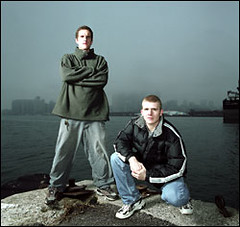U.S. army killed unarmed Iraqis in defiance of law,
war-resister hearing told
Colin Perkel
Wednesday, December 08, 2004
|
TORONTO (CP) - A former United States marine told a refugee hearing for an American war dodger Tuesday that trigger-happy U.S. soldiers in Iraq routinely killed unarmed woman and children, and murdered other Iraqis in violation of international law.
In chilling testimony intended to bolster the asylum claim of compatriot Jeremy Hinzman, former staff sergeant Jimmy Massey recounted how nervous soldiers trained to believe that all Iraqis were potential terrorists often opened fire indiscriminately.
"I was never clear on who the enemy was," Massey, 33, told the hearing.
"If you have no enemy or you do not know who the enemy is, what are you doing there?"
On several occasions, his soldiers pumped hundreds of bullets into cars that failed to stop at U.S. military checkpoints, killing all occupants - who were later found to be unarmed, Massey said.
On another occasion, marines reacted to a stray bullet by killing a small group of unarmed protesters and bystanders, said Massey, who said he suffers from nightmares and post-traumatic stress disorder.
"I was deeply concerned about the civilian casualties," he said.
"What they were doing was committing murder."
Massey's statements echoed earlier testimony from Hinzman, who says he fled the U.S. military because he believed the invasion of Iraq was illegal, and any violent acts he committed there would be unconscionable.
"This was a criminal war," Hinzman said.
"Any act of violence in an unjustified conflict is an atrocity."
Hinzman, 26, deserted his regiment in January just days before being deployed to Iraq, and fears he will be unfairly court-martialled if returned to the United States.
Hinzman told the Immigration and Refugee Board hearing that the U.S. military regarded all Arabs in the Middle East - Iraqis in particular - as potential terrorists to be eliminated.
"We were referring to these people as savages," Hinzman testified.
"It fosters an attitude of hatred that gets your blood boiling."
While a federal government lawyer said U.S. deserters often get about a year in jail, Hinzman countered he would be treated more harshly because of his views on the Iraq war.
"Serving even one day in prison for refusing to comply with an illegal order is too long," Hinzman said.
"I would be prosecuted for acting upon a political belief . . . for refusing to do something that was wrong."
A Washington Post reporter covering the hearings said Americans are extremely sensitive to Hinzman's request for asylum because of parallels to the Vietnam War.
"There's a great deal of worry that Iraq is beginning to look a little like Vietnam," said Doug Struck.
 "Americans are very worried when their servicemen start saying, 'No, we're not going to go.' It sends alarms off."
"Americans are very worried when their servicemen start saying, 'No, we're not going to go.' It sends alarms off."
Hinzman, whose only prior knowledge of Canada came from CBC radio broadcasts, admitted it is seemingly "preposterous" for an American to seek asylum in Canada.
He said he chose to go public with his claim to head off any possibility of being quietly sent home.
"I felt that (Canadian) authorities could say, 'You are an American. What the hell are you doing? Go back.' "
Hinzman's lawyer, Jeffry House, said Canada has allowed deserters from other countries to stay and compared Hinzman's situation to that of the former Soviet Union.
"People used to be prosecuted for their political opinions and activities," House said in an interview.
"That was persecution. It is fundamentally wrong."
Hinzman enlisted voluntarily for four years in November 2000. He was a crack infantryman with the 82nd Airborne Division based in Fort Bragg, N.C., until he deserted after his application as a conscientious objector failed.
Brian Goodman, who is chairing the three-day hearing that ends Wednesday, indicated he will likely decide Hinzman's claim early in the new year.

No comments:
Post a Comment